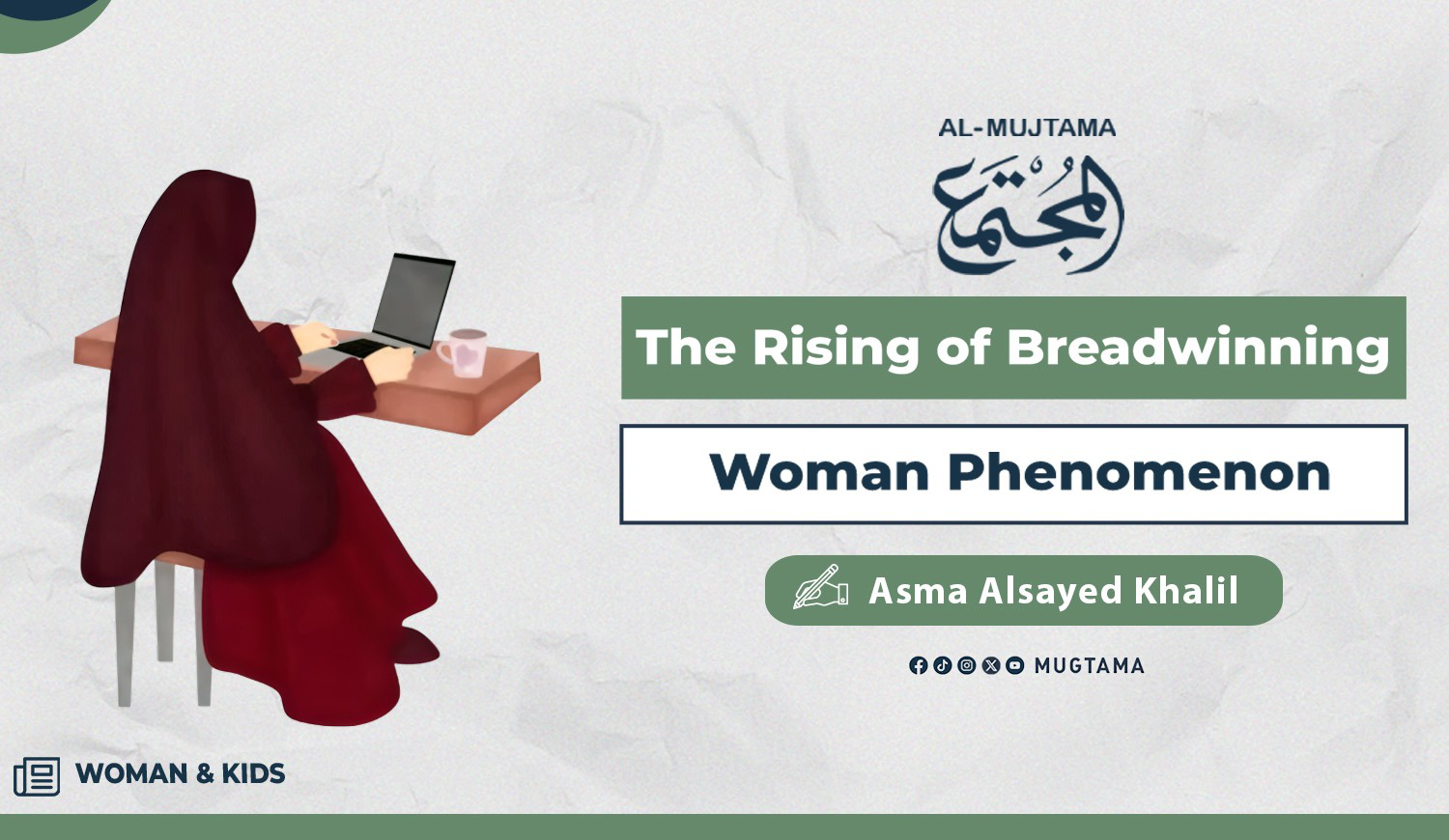The Rising of Breadwinning Woman Phenomenon

The breadwinning woman is the
woman who supports her family or members of it without relying on a man
(husband, father, or brother). This may be due to widowhood or divorce, or
perhaps the husband is present but unable to provide for reasons we will
mention later. She may also be unmarried, supporting herself or her family
after losing the provider (father or brother), or due to other circumstances
that forced her into hard work and labor.
The phenomenon of the
breadwinning woman is global; it is not limited to one country. It spreads
across both the developed and developing worlds. Breadwinning women make up
around 23% of households in North America, 28% in Europe, and 30% in Japan. In
the Arab world, they represent 15% in Morocco, 23% in both Yemen and Sudan, 11%
in Lebanon, and 16% in Egypt. Although studies in the Gulf Cooperation Council
countries are scarce, they point to 6% in the UAE and 11% in Bahrain.
Why the Breadwinning Woman Phenomenon Increased?
Several social and economic
factors have contributed to the increase of the “breadwinning woman” in the
Arab world. The most important are:
- The spread of divorce: In
most cases, this results in the husband abandoning family responsibilities
such as living expenses, health, and education.
- The death of the husband:
This forces the woman to assume his role in providing for the family and
meeting life’s needs.
- Loss of the provider for unmarried women: In
this case, the girl takes on the financial responsibility of supporting
family members, either partially or fully.
- Other cases: Such as the
husband’s illness or disability, his weak income (requiring the wife to
share the financial burden), or the husband abandoning his family through
desertion without legal separation, or due to addiction or
miserliness.
Other societal transformations
have also fueled this phenomenon, reshaping the structure of the family, its
functions, and the roles of its members. Among them:
- The rise in women’s education levels:
This led some to pursue economic independence, and some even chose not to marry or to delay marriage for this very reason.
- The decline of traditional patriarchal values:
Along with shifting gender roles, some women voluntarily embraced this
role, influenced by the call for gender equality.
- The expansion of job opportunities for women:
With the development of many sectors of life and the increasing reliance
on women in managing or contributing to them, it has become natural for
the working woman to rely on herself economically.
- Male migration in search of work:
This makes the woman practically the head of the household, taking on
administrative and financial responsibilities, even if the husband
continues to send money.
Challenges Facing the Breadwinning Woman
The breadwinning woman,
especially in Arab communities faces diverse challenges—economic, social,
legal, and psychological. Many breadwinners do not find suitable job
opportunities for their qualifications and circumstances. And if they do get a
job, it is often unstable and pays less than a man’s wage.
The double burden of working
outside the home and raising children at the same time limits her ability to
improve her economic standing. Despite her efforts, she may face negative
social attitudes, even being stigmatized as a failure for not preserving her
family.
There are also legal challenges,
such as struggles to secure alimony, inheritance, or educational guardianship,
not to mention the pressures of children’s education and taking on the father’s
role in addressing their behavioral issues.
Given these complex
responsibilities, the breadwinning woman suffers from unwanted emotions and
disorders that affect her efficiency and her social and psychological
acceptance. These manifest in physical, emotional, or behavioral symptoms. She
may struggle with self-dissatisfaction, lack of psychological balance, and
often lacks moral support—especially if she is pitied or looked down upon by
those around her. This makes her feel inadequate and lacking self-confidence.
These conflicted emotions, when combined with loneliness and emotional
emptiness, may lead to obsessions and even suicidal tendencies.
The Responsibility of Governments and Societies
The immense challenges faced by
the breadwinning woman must not be left to her alone. Governments and societies
alike are responsible for helping her, integrating her into public life, and
granting her security and support. Every individual in society can play a part
in this support.
The responsibility of governments:
- Provide employment opportunities:
Giving breadwinning women priority in hiring, while taking their
circumstances into account.
- Support small projects for female
breadwinners: By offering easy bank loans, establishing
vocational training centers to enable them to enter the labor market, and
providing platforms to showcase their products.
- Offer free health, educational, and housing
services for their children: To reduce the absence of
the father and the hardships of life.
- Take on a media and educational
responsibility: By promoting respect and solidarity toward
breadwinning women, raising awareness of the challenges they face, and
highlighting their success stories.
- Enact fair laws and legislation: To
ensure the rights of breadwinning women and their children in managing
their legal and administrative affairs without bureaucratic obstacles,
while also protecting them from violence and exploitation.
The responsibility of society and civil organizations:
- Provide direct assistance to those in need:
For example, through zakat funds or targeted support funds.
- Strengthen the role of breadwinning women
through religious discourse: Organizing courses and
workshops to support them spiritually and psychologically.
- Offer help in childcare: A
role that can also be carried out by relatives, neighbors, and the
surrounding community.
You May Also Read:
- Women’s Role in Society and Family in Islam vs. the West
- Feminism in Crisis… From Empowerment to Excess
- Women in Islam: Full Rights and Independent Personality
-------------------------------------------------------------











